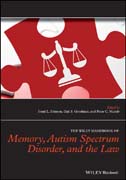
The Wiley Handbook of Memory, Autism Spectrum Disorder, and the Law
Johnson, Jonni L.
Goodman, Gail S.
Mundy, Peter C.
An Important Contribution to Understanding Autobiographical and Eyewitness Memory in Those with ASD and the Unique Legal Challenges They Present This book offers an in–depth discussion of how autobiographical and eyewitness memory operate in individuals with Autism Spectrum Disorder (ASD) and provides unique insights into current challenges faced by legal professionals, forensic psychologists, clinicians, and others who extend services to those with ASD. Throughout the book, authors demonstrate why a nuanced understanding of autobiographical and eyewitness memory is required when assessing individuals with ASD, given the developmental, social, and cognitive deficits at play. Authors review current legal services and structures, and explore ideas on whether and how modifications can be made to meet the needs of all individuals who seek and deserve justice, including individuals with ASD. The Wiley Handbook of Memory, Autism Spectrum Disorder, and the Law is sure to spark debate within the mental health and legal communities, while advancing knowledge on the role of key clinical features of ASD in autobiographical and eyewitness memory. The book is distinct in its exploration of ways in which the legal system, with its formal yet inherently social infrastructure and regulated due process demands, should offer services to those with ASD. Of note, authors question if current policies and practices, such as reliance on interviewing protocols standardized for typically developing individuals, are adequate. The book is divided into three sections with the first providing a discussion of theoretical viewpoints on how memory functions in those with and without ASD, and providing a specialized consideration of developmental issues. A second section reviews empirical evidence, followed by a third and final section addressing legal and clinical considerations, including techniques for interviewing individuals with ASD. The first book offering an expert, science–based review of autobiographical and eyewitness memory research on those with ASD and the associated legal challenges Provides thought–provoking, informative, often debated observations on memory in ASD from an international team of experts Offers summaries of what is known about memory abilities in those with ASD as well as what is left unknown that future researchers will need to address and that legal professionals should consider. A book that does much to advance the research frontier in the study of memory in ASD and application to the legal system, The Wiley Handbook of Memory, Autism Spectrum Disorder, and the Law is important reading for academic researchers, clinicians, judges, jurors, law enforcement officials, and public policy makers alike. INDICE: Notes on Contributors vii .Autism Spectrum Disorder, Memory, and the Legal System: Knowns and Unknowns 1Jonni L. Johnson, Gail S. Goodman, and Peter C. Mundy .Part I Autobiographical Memory Theories and Autism Spectrum Disorder 9 .1 A Relational Processing Framework of Memory in Autism Spectrum Disorder 11Sebastian B. Gaigg and Dermot M. Bowler .2 Autobiographical Memory in Autism Spectrum Disorder through the Lens of Fuzzy Trace Theory 27Haylie L. Miller, Timothy N. Odegard, and Valerie Reyna .3 Executive Function and Complex Processing Models 53Diane L. Williams .4 The Self in Autism and Its Relation to Memory 70Sophie E. Lind, David M. Williams, Catherine Grainger, and Julia Landsiedel .5 Autobiographical Memory and Theory of Mind in Autism Spectrum Disorder 92Céline Souchay, Matilda Ohlsson, and Tiziana Zalla .6 Autism Spectrum Disorders and Autobiographical Memory in the Forensic Setting 107Henry V. Soper, Irina Zilberfayen, and Arthur MacNeill Horton, Jr. .Part II From Autobiographical Memory to Eyewitness Memory: Empirical Findings and Methodological Assessments 123 .7 Development of Autobiographical Memory in Autism Spectrum Disorders 125Lorna Goddard .8 General Memory Abilities for Autobiographical Events in Adults with Autism Spectrum Disorder 146Laura Crane and Katie L Maras .9 Eyewitness Memory Abilities in Typically Developing Children 179Yoojin Chae, Sue D. Hobbs, and Daniel Bederian ]Gardner .10 Perceptual, Cognitive, and Social Foundations of Eyewitness Identifications: Why Do Identifications Go Wrong? 196Emily F. Wood and Deborah Davis .11 Eyewitness Memory in Children with Autism Spectrum Disorder 214Michael Carlin .Part III Investigative Tools and Legal Application 229 .12 Interactions of Individuals with Autism Spectrum Disorder with the Criminal Justice System: Influences on Involvement and Outcomes 231Neil Brewer and Robyn L. Young .13 The Cognitive Interview and Its Use for People with Autism Spectrum Disorder: Can We Create an ASD Friendly Version? 245Joanne Richards and Rebecca Milne .14 Narrative Elaboration Technique 270Lorinda B. Camparo, Ambar Guzman, and Karen J. Saywitz .15 Interviewing Children with Autistic Spectrum Disorder: The NICHD Protocol and Ten ]Step Investigative Interview 292Lindsay C. Malloy, Allison P. Mugno, and Andrea Arndorfer .16 Clinical and Forensic Interviewing of Children and Adults with Autism Spectrum Disorder: Strategies for Improving Eyewitness Memory Reports 311Elisa Krackow .17 Children with Autism Spectrum Disorder in the Courtroom: How Courts Handle Testimony Today and What We Can Do in the Future 340Deborah Goldfarb and Alejandra Gonzalez .Index
- ISBN: 978-1-119-15826-4
- Editorial: Wiley–Blackwell
- Encuadernacion: Cartoné
- Páginas: 384
- Fecha Publicación: 20/07/2018
- Nº Volúmenes: 1
- Idioma: Inglés
